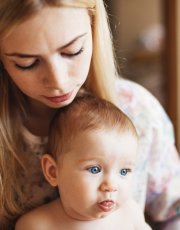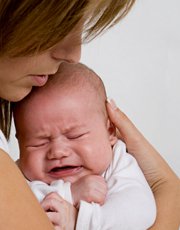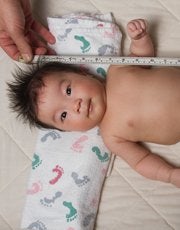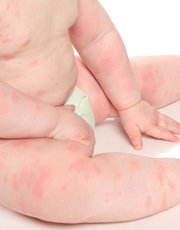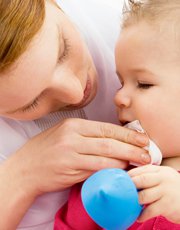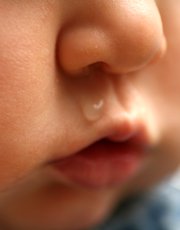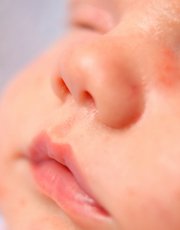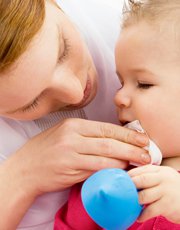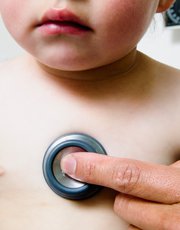
We believe breast milk is the best food for infants. When in consultation with their healthcare professional, mothers and families find that optimal breastfeeding is not possible due to their infant’s medical condition, formulas for special medical purposes play a vital role in providing essential nutrients to infants. We have a global commitment to market breast-milk substitutes responsibly.
This website is about the management of cows’ milk protein allergy and nutritional solutions intended for infants. By continuing on this website, you accept that Nestlé Health Science supplies the information at your own request.
Are you a healthcare professional (HCP) or a parent?
SYMPTOM: ECZEMA
What is baby eczema?
Eczema in babies, like in adults, is a highly itchy, common inflammatory skin condition characterised by red or brownish, dry, cracked and scaly skin, which is especially itchy at night. In babies, eczema usually appears on the face, the scalp, and outer surfaces of the limbs.
Generally, doctors use the term 'infant eczema' as an umbrella term to describe two conditions that usually appear between 2 to 4 months of age:
- Atopic dermatitis – usually an inherited chronic condition more common among babies with a family history of allergies, eczema and asthma
- Contact dermatitis - a rash that develops when your baby’s skin comes into contact with an irritating substance. Once the irritant is removed, the rash usually clears quickly.
Eczema happens when the body makes too few fatty cells (ceramides). If your baby doesn't have enough of them, their skin will lose water and become very dry.
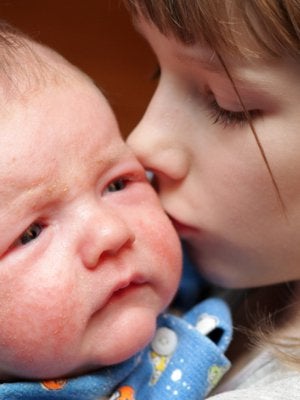
How to spot eczema in babies
Eczema in babies doesn't look the same on every baby. In babies with light skin, it tends to show up as patches of red skin, but in darker-skinned babies, the rash might look purplish, brownish, or greyish. These patches are dry, scaly and rough to touch. They can also be itchy for baby.
Whilst it can appear almost anywhere on your baby's body, it most often flares up in the crooks of the arm or behind the knees. Baby eczema can also appear on their cheeks or in the folds of their neck and groin.
Baby eczema is sometimes confused with cradle cap. However, cradle cap is much less itchy and irritated. It also generally appears on the scalp, eyelids, nose, eyebrows, and behind the ears.
Causes of eczema in babies
The exact causes of eczema are not really known, but in many cases, your baby may suffer from eczema due to a food allergy, e.g. Cows’ Milk Allergy (CMA). Many babies who develop eczema early on in infancy are allergic to one or more allergy-causing substances. If there is a family history of allergic conditions, such as asthma or hay fever, your baby may be more likely to develop eczema.
Baby eczema is one of the most common symptoms of CMA
As well as genetics playing a role, certain fabrics, aerosols, cigarette smoke and irritants like soap, washing detergents and bubble bath can all be triggers of skin irritation that can then lead to eczema.
Could it be Cows' Milk Allergy?
Babies with CMA usually experience more than just one symptom and these symptoms can be very different from one another.
If you think that your baby has eczema, it may be CMA. You may have even noticed other symptoms (besides eczema), which may affect other parts of your baby’s body.
For a simple and easy way to understand the symptoms associated with CMA, you can use our symptom checklist or symptom diary to track symptoms.
This will allow you to select all the symptoms that your baby may have that can be cow’s milk-related. You can then discuss these with your doctor.
In any case, if you have any doubts or concerns about your baby’s health, you should always seek advice from a medical professional as soon as possible.
Baby eczema treatment
While most babies grow out of their eczema, it’s worth maintaining a good bath time routine. This will help your baby maintain a good skin barrier. It's also important to apply a moisturiser designed for babies with eczema. Sometimes, a doctor can prescribe something stronger if you don't feel like it's working.
Keeping your baby’s nails short will also stop them from scratching the skin too harshly and irritating the rashes more.
If your baby's eczema is caused by a food allergy such as CMA, you can try our infant formula, specifically designed to help manage CMA symptoms.



